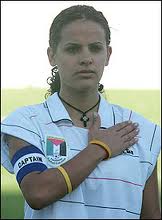By Andrew Warshaw in Doha
March 19 – Speaking at the Securing Sport 2013 conference in Doha, Palestine’s leading women’s football pioneer has added her name to those who believe UEFA were fundamentally wrong to award this summer’s European under-21 championship to Israel.
“I believe in equality and when I sadly see what Israel is doing to the Palestinians, it’s very hard to understand why they have been given such an honour,” Thaljieh said.
“I have a lot of time for UEFA who are against racism. They know what they are doing but maybe these people should have thought more about giving the tournament to Israel because it’s like giving them a medal and that everything is fine. Maybe they should have been more sensitive.”
The counter-argument, Thaljieh conceded, is that there is now a chance that Israel staging the event will have the opposite effect, in other words flagging up the differences in living conditions in the two Middle East neighbours.
“My hope is that actually that by bringing international teams to Israel to play football, maybe this will change something among the leaders in terms of fair play and justice,” she said.
“I do think people should think more than to give Israel this opportunity…but anyone who goes to Israel (for the championships) must also go to the West Bank to see the differences in lifestyle. They are even stealing our breath. I’d like people to see both sides.”
Thaljieh, named as a Champion for Peace at the recent Sochi forum for peace and sport to mark International Women’s Day, was speaking after making a strongly-worded address to the Securing Sport 2013 conference in Doha.
Recounting how, since her retirement, she had tried to use football as a tool for change in the region, she was more cautious when asked whether the Palestinians – who play as part of Asia – and Israel, members of UEFA, could ever line up against each other.
“The issue with Palestine and Israel is very complicated. It’s fine to play against Israel but we have to have equality, without facing any checkpoints or soldiers putting their weapons on my face. When I have a wall separating me from my neighbours, how can I go and play as an equal?” she said.
Thaljieh, who played for Palestine for six years until 2009, presented a graphic illustration of what it was like growing up as a female footballer in the region before turning her hardship to empowering the women’s game and trying to reduce discrimination.
“Living under the occupation surrounded by checkpoints and walls, people asked why I wanted to play football. They called me tomboy and said no-one would want to marry me. I had to live with all this, just because I was a woman. But I believe sport gave me the power to challenge these circumstances.”
Behind virtually every comment was a powerful political agenda. Amidst a burst of spontaneous support, Thaljieh told delegates: “Sport liberates the mind. It makes you feel the sky is the limit: not walls, not borders, not checkpoints.”
Whilst her remarks were passionate and clearly heart-felt, they were invariably laced with hard-hitting, at times provocative taunts about Israel’s human rights record and a debate about land ownership.
“Every minute in Palestine there is a challenge. Not just in sports but everything: things like medication and water which sometimes we only get once every two months. I believe in love your enemies but you can’t imagine what’s going on in Palestine unless you see it with your own eyes. From the moment they give us the piece of land we are arguing about, then of course we could play against them. But they treat dogs better than us.”
Contact the writer of this story at moc.l1743905154labto1743905154fdlro1743905154wedis1743905154ni@wa1743905154hsraw1743905154.werd1743905154na1743905154

